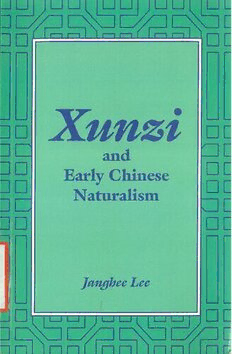
Xunzi and Early Chinese Naturalism PDF
144 Pages·2004·26.499 MB·English
Most books are stored in the elastic cloud where traffic is expensive. For this reason, we have a limit on daily download.
Preview Xunzi and Early Chinese Naturalism
Description:
Xunzi, one of the founder of Confucianism, is often compared to Aristotle, in the sense that Xunzi is a great synthesizer as well as an original thinker in his own right. This book situates Xunzi's philosophy in the context of early Chinese philosophy, particularly with what the author identifies as Chinese "naturalism".Early Chinese naturalism refers to a unique Chinese philosophical orientation that seeks normativity in the realm of nature. In early China, where the notion of transcendence never occupied a central position in philosophical discourse, it was perfectly reasonable for a philosopher to turn to "naturalness", or "spontaneity" of nature as a source of value or guidance for a way of life. Janghee Lee argues that the most prominent feature of Xunzi's philosophy - his famous doctrine that human nature is bad and his strong emphasis on ritual - can be best understood as Xunzi's critical response to the naturalistic trends of his time, which can be found not only in Daoist philosophers like Zhuangzi, but also in other Confucian philosophers such as Mencius. According to the author, Xunzi's concept of xin (mind-heart) provides a crucial hint for understanding his ritual-oriented philosophy, clearly contrasted with the naturalistic tendencies of early Chinese philosophy.
See more
The list of books you might like
Most books are stored in the elastic cloud where traffic is expensive. For this reason, we have a limit on daily download.
